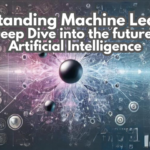Artificial Intelligence (AI) has become an integral part of our daily lives, often working behind the scenes to enhance our experiences and streamline various processes. As the technology continues to evolve, its applications are expanding across numerous sectors, revolutionizing the way we live, work, and interact with the world around us. In this blog post, we’ll delve into the various domains where AI is making significant impacts and explore specific examples of its implementation.
1. Healthcare
AI is transforming the healthcare industry, offering innovative solutions for diagnosis, treatment, and patient care.
Examples:
- Medical Imaging Analysis: AI algorithms can analyze X-rays, MRIs, and CT scans to detect abnormalities with high accuracy, assisting radiologists in early diagnosis of diseases like cancer.
- Drug Discovery: AI accelerates the process of identifying potential drug candidates by analyzing vast amounts of biological data and predicting molecular interactions.
- Personalized Treatment Plans: Machine learning models can analyze patient data to recommend tailored treatment plans based on individual genetic makeup and medical history.
- Robotic Surgery: AI-powered surgical robots assist surgeons in performing complex procedures with enhanced precision and minimal invasiveness.
2. Finance
The financial sector has embraced AI to improve decision-making, risk assessment, and customer service.
Examples:
- Fraud Detection: AI algorithms can analyze transaction patterns in real-time to identify and prevent fraudulent activities.
- Algorithmic Trading: AI-powered trading systems can make split-second decisions based on market trends and historical data.
- Credit Scoring: Machine learning models can assess creditworthiness more accurately by considering a wider range of factors than traditional methods.
- Chatbots for Customer Service: AI-powered chatbots can handle customer inquiries, providing 24/7 support and reducing the workload on human agents.
3. Transportation
AI is driving the future of transportation, from autonomous vehicles to optimized logistics.
Examples:
- Self-Driving Cars: Companies like Tesla and Waymo are developing AI systems that can navigate roads, interpret traffic signals, and make real-time decisions to ensure passenger safety.
- Traffic Management: AI can analyze traffic patterns and adjust signal timings to optimize traffic flow in urban areas.
- Predictive Maintenance: AI algorithms can predict when vehicles or infrastructure components are likely to fail, allowing for proactive maintenance.
- Route Optimization: AI can calculate the most efficient routes for delivery services, considering factors like traffic, weather, and package priorities.
4. Education
AI is revolutionizing the education sector by personalizing learning experiences and automating administrative tasks.
Examples:
- Adaptive Learning Platforms: AI-powered systems can adjust the difficulty and content of lessons based on a student’s performance and learning style.
- Automated Grading: Machine learning algorithms can grade essays and open-ended questions, providing consistent and timely feedback.
- Intelligent Tutoring Systems: AI tutors can provide personalized assistance to students, answering questions and explaining concepts in real-time.
- Early Intervention: AI can analyze student data to identify those at risk of falling behind, allowing for timely intervention.
5. Manufacturing
AI is enhancing efficiency and quality control in manufacturing processes.
Examples:
- Predictive Maintenance: AI can predict when machinery is likely to fail, allowing for proactive maintenance and reducing downtime.
- Quality Control: Computer vision systems can inspect products at high speeds, identifying defects with greater accuracy than human inspectors.
- Supply Chain Optimization: AI can analyze market trends and historical data to optimize inventory levels and streamline supply chains.
- Collaborative Robots: AI-powered robots can work alongside humans, assisting with tasks that require precision or handling hazardous materials.
6. Entertainment and Media
AI is transforming how we create, consume, and interact with media content.
Examples:
- Content Recommendation: Streaming platforms like Netflix use AI to analyze viewing habits and recommend personalized content.
- Deepfake Technology: While controversial, AI-powered deepfake technology is being used in film production to de-age actors or recreate historical figures.
- Automated Content Creation: AI can generate news articles, social media posts, and even music compositions.
- Virtual Reality and Gaming: AI enhances gaming experiences by creating more realistic non-player characters and adapting game difficulty in real-time.
7. Agriculture
AI is helping to address global food security challenges by optimizing farming practices.
Examples:
- Precision Agriculture: AI-powered drones and sensors can monitor crop health, soil conditions, and water levels to optimize resource usage.
- Automated Harvesting: Robotic systems guided by AI can harvest crops more efficiently than traditional methods.
- Pest and Disease Detection: AI can analyze images of crops to detect early signs of pest infestations or diseases, allowing for timely intervention.
- Yield Prediction: Machine learning models can predict crop yields based on various factors, helping farmers make informed decisions about planting and harvesting.
Conclusion
The applications of AI are vast and continually expanding. From healthcare to agriculture, AI is revolutionizing industries and offering solutions to complex problems. As the technology continues to advance, we can expect to see even more innovative applications that will shape the future of our society. However, it’s crucial to approach AI development and implementation with careful consideration of ethical implications and potential societal impacts. By harnessing the power of AI responsibly, we can create a future where technology enhances human capabilities and improves quality of life for all.

